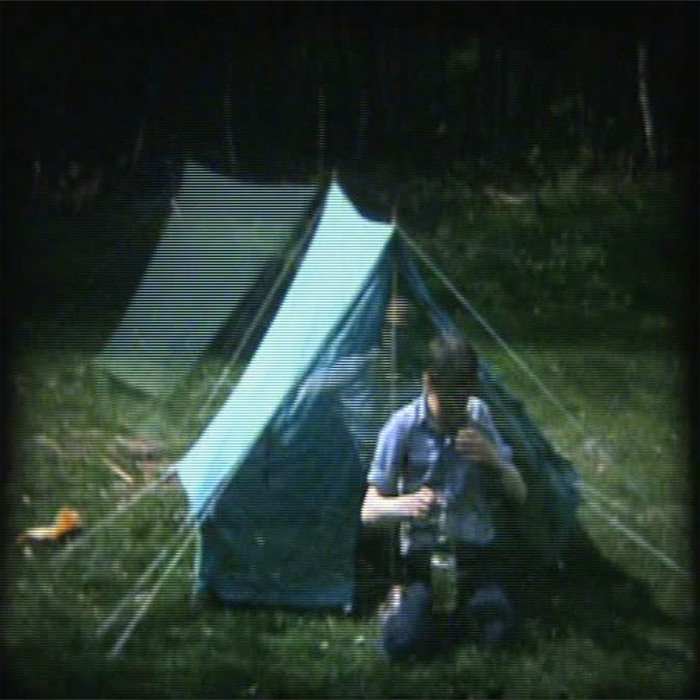Default This | He Was Eaten By Owls

He Was Eaten By Owls
I first met Kyle just over a year ago, before a set at Surya in Kings Cross. The nights there are mostly tailored and promoted by the Glasswerk zine, and admittedly I had primarily gone to show some support for Selectric, who were either starting or concluding a tour.
But my intrigue for He Was Eaten By Owls, also on the bill that night, had been piqued by a Musical Mathematics sampler which contained a spry track called Part II. The Tupenny Rush And The Penny Dreadful. The vibrant urgency created by just a Spanish guitar and a drum kit on that recording left an indelible mark alongside tracks from the likes of Alarmist, Suffer Like G Did, Patchwork Natives and Bloody Mammals, which in itself was no mean feat.
“It’s just a feeling. It’s like, how do you tell somebody how it feels to be in love? How are you going to tell anybody who has not been in love how it feels to be in love? You cannot do it to save your life. You can describe things, but you can’t tell them. But you know it when it happens. That’s what I mean by free. I’ve had a couple times on stage when I really felt free and that’s something else. That’s really something else! I’ll tell you what freedom is to me: NO FEAR! I mean really, no fear. If I could have that half of my life. No fear!” – Nina Simone
So I got there early and flitted between milling around the hallway admiring the Selectric merch, and chain-smoking in a sharp February breeze. I met Kyle somewhere in between.
Full disclosure: I have smoked controlled substances with him on many occasions since, mostly talking music and poorly-soldered pedals. He is a kind soul, and is often flanked by his ageing Border Collie, Bruce, who epitomises this good nature.
Bruce, Kyle tells me, was abandoned. He was tied to a lamp post for three days without food or water, howling throughout in distress from the torment. A nearby family, having tired of the noise by day three, untied and briskly marched him to the local police station. Kyle happened upon them en route, striking up a conversation about the pooch and unintentionally learning of its woes. He offered to adopt the dog there and then, and ten years later they are inseparable.
Bruce has two tricks. Firstly, and impressively, Kyle has taught the dog to bark aggressively when he says the word ‘police’. This is startling to witness as an outsider, given Bruce is usually such a passive and calming presence.
Bruce’s second trick is self-taught. He howls, uncontrollably, whenever Kyle plays He Was Eaten By Owls. Music by any other artist does not provoke this reaction, only his.
Bruce wasn’t at Surya that February, milling around the merch and chain-smoking before the show. He is a dog. But I like to think that his chance meeting with Kyle a decade ago was in some way akin to our own meeting that night.
So it is in this spirit that I will now howl on about the music of He Was Eaten By Owls.
Their set at Surya was blinding, more so considering it was delivered through a blown bass amp. It served to highlight the enviable understanding between Kyle and drummer Vilius Kancleris, as the tracks skilfully contorted between mellow ornamentation and scruffy fuzz in a flicker. This stripped-back version of HWEBO, bare and bullish, is the one I came to adore. You can see why above.
“Sex and race, because they are easy, visible differences, have been the primary ways of organizing human beings into superior and inferior groups, and into the cheap labor on which this system still depends. We are talking about a society in which there will be no roles other than those chosen, or those earned. We are really talking about humanism.” – Gloria Steinem
30 Chorus Blues From The Hitchhiking Dead, HWEBO’s first album, is a bold and assured expansion of this sound which has been almost a decade in the making. Indeed, over the last year I’ve known Kyle, it’s been at the centre of his world. The title is taken from a poem by Michael Horowitz and Pete Brown, part of which you can hear being performed live at Southampton University in 1962 here, and which only partially alludes to the complexity and the sheer breadth of themes running through this record’s duration.
The underlining subject, however, is the intersectionality theory, one bigger than any single person or instrumental duo you might think. But the way the sonic textures are interwoven over the course of the LP, punctuated by snatches of candid soul-bearing from Gloria Steinem and Dorian Corey (among others), deftly relays the gravity of the matter.
Most Young Kings Get Their [sic] Head Cut Off , as an example, is about the civil rights movement (the record sleeve proudly displays the logo), with the title from a Basquiat painting. The long drone at the start represents the drudgery of white supremacy, the phasing jazz attach is the people fighting back, and all the hopeful stuff towards the tail is the potential future prospects for people of colour and everyone in general.
It’s a remarkable undertaking considering not a single lyric is being sung, and when isolated as a piece of music, without the concept, it still exhibits brilliance and frankly deserves to be heard.
Examples of such sorcery are commonplace throughout this record. Be it rich, heavy noise and glitchy electronica exploring queer issues and gender politics; a heartbreakingly emotive soundtrack-style tone-poem in solidarity with refugees; a choral filled ballad for murdered Brazilians; poly-temporal, ambient chance-music illustrating issues of class and social inequality; an expansive string drone relating to the mistreatment of the unwell or fast, technical acoustic mathematics representing the web-like reaches of the intersectional theory in modern society.
I’ve lifted that from the press release, but it’s head and shoulders above my babble.
And while I’m recycling, it’s worth pointing out that Kapil Seshasayee suggested 30 Chorus may be the Sgt. Peppers of math rock, a real game-changer. I think he’s onto something there. In a climate of trills for the sake of trills, this record is an affirmation that music can still mean something.
He Was Eaten By Owls was born out of London’s anarchist squat scene, and over the years honed a sound loosely described today as “chamber punk”. While this conjures up wonderful imagery of ruffs and mohawks, it does serve to encapsulate an anti-establishment cynicism, an inquisition of the status quo. While dormant in most, as e-petitions act the substitute for direct action, perhaps then this album should incite a call to arms.
Stranger things have happened. But as soon as opener We Shall Oscillate Like A Pendulum flashes into life, excitable and auspicious, it revitalises the senses, flooding hope like morning light.
30 Chorus was recorded over the course of a year at House of Strange Studios, Fu Inle Studios and Unit 8c with some of the UK underground scene’s top engineers, before being mixed by revered knob-twiddler Thomas Le Beau Morley. Musicians from the London Symphony Orchestra, The Ginsberg Jukebox, Colin Samurai and Sol Flare lend themselves to the opus as well; a stark sense of community.
“I always had hopes of being a big star. But as you get older, you aim a little lower. Everybody wants to make an impression, some mark upon the world. Then you think, you’ve made a mark on the world if you just get through it, and a few people remember your name. Then you’ve left a mark. You don’t have to bend the whole world. I think it’s better to just enjoy it. Pay your dues, and just enjoy it. If you shoot an arrow and it goes real high, hooray for you.” – Dorian Corey
The artwork was overseen by French/Swiss installation artist Henrik Potter and is a beautiful creation, only 500 of which exist on vinyl. The sleeve also features a short essay by feminist scholar Georgia Lassoff, which includes the line:
We must silence ourselves so that others can communicate the harshness of their lived realities, and only this humility will enable us to fight together for our interdependent liberation.
Such a humbling becomes innate when one traverses the record, and resonates loudly during moments such as Do Not Go Gentle Into That Good Night, a piece about governmental policy towards mental illness and ‘criminality’, and how non-white people are treated in the media in relation to the language used and the way information is delivered about them. It features a quote from Sirhan Sirhan, who believes he was brainwashed into shooting Bobby Kennedy.
Chorus 30 From Blues For The Hitchhiking Dead is a paragon of DIY culture, something to celebrate and aspire to. A unique labour of love in this modern time of quick fix, download-and-go consumerism. A retort to inequality, a guidebook for humanity.
From the bombastic glamour of Throw Away Your Keys For Bodies Contain No Locks They Understand to the fragile lament of Sometimes It Feels Like Someone Else Is Wearing My Body (which I’m convinced is the soundtrack to a Shane Meadows biopic), the diversity this duo have been able to document is boundless.
Oh, and it’s completely free.





